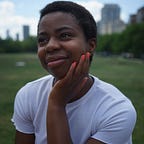The Elusiveness of Freedom to Black People
Picture this: It’s a sunny afternoon. The sun will set in a few hours but now you enjoy basking in its warmth. You’re sitting at the light wooden dining table in your living room by the windows that provide ample opportunities to people watch. A video plays quietly in the background but you’re not watching it. Your attention darts back and forth between the crisp white walls, the trees and your front door.
The trees look like a moving painting. As you sit frozen in your seat, immobilized except for your head, you question if the trees are real. The front door looms menacingly towards you. The walls don’t provide enough space between you and it.
You just learned about the murder of Breonna Taylor and wonder if the police will also kick in your door. You rationalize that the third-floor walk-up wouldn’t be worth their time. You wonder if they can see you from your window. Unlike the trees that look like green splotches against blue paint, the police cars circling your block look real.
Every fourth of July holiday, I think about two things: my nearing birthday and What to a Slave is the Fourth of July by Fredrick Douglas. What does it mean to watch your oppressors and abusers celebrate an independence day from their oppressors? How can oppressors celebrate their long-fought independence and then ask an enslaved group of people how much they love the holiday? I never understood how oppressed people could justify oppressing other people.
Freedom is an ideology that one could argue no one has obtained. Systems and social constructs, like capitalism and race, maintain an iron grip over society that we seldomly escape. Short of going off the grid and living a life of solace, attainable freedom is very individualistic and mental. Living the life you want to live and ignoring social norms is freedom to some people, but even that is a privilege. Along with your socioeconomic status, skin color dictates how safely you can go against systems of oppression or even enjoy your day-to-day life. The progress made between Frederick Douglass’s 1852 speech and now is the result of several social movements that weakened the restrictive grip of systems of oppression but have had yet to dismantle them.
Have you ever heard of the saying, “sick and tired of being sick and tired”? That’s how Black people felt during the protests for Black lives in 2020. Every announcement of the police murdering a Black person was a stark reminder of how far we are from freedom. The US justice system shouldn’t need millions of people across the country taking to the streets to enact justice for police brutality. The summer of 2020 felt like a repetition: murdered Black person by the police, announcement, protest, no justice, rinse, wash and repeat.
It wore on me. I experienced a frequency of mental health problems I hadn’t before. I had to take time off of work because I ruminated over the deaths, particularly Breonna Taylor. She was a young, Black woman with a promising future. She was only a few years older than me. She was in her home, her place of comfort and relaxation, a necessity during the COVID-19 pandemic. She probably went to bed assuming she was safe and sound. And then she was murdered by the police, a murder that took too long to be punished.
That’s why in the summer of 2020 the trees looked fake, my walls too small, and I developed a sudden fear of my front door being kicked in by the police. I’m a young, Black woman with a promising future that can be taken away at any moment because of a system that doesn’t see the intrinsic value and humanity of Black people. What does freedom mean when the only thing promised to me is staying Black and dying? What does freedom mean when your place of solace can turn into a murder scene all because you were born with the wrong color skin? What does freedom mean in 2021 to a Black person when it takes protests and hashtags for a few bad apples to see retribution?
I don’t celebrate the fourth of July, I celebrate the day off. I attend cookouts, spend time with family or friends, catch up on chores or simply relax. But I don’t celebrate America’s independence from the British. Not all of America is free. I fear my version of freedom is accepting I’ll never truly be safe outside or in my own home. What alternative is there? How else do I function and continue my day-to-day life if I fear my front door?
I struggle to answer what freedom means because I’ve only experienced pieces of it in specific parts of my life. The most I can answer is what freedom is not. It is not America’s treatment of Black people. It is not systemic racism. It’s not using a day off for a momentary escape from the reality of your life. It certainly wasn’t the summer of 2020.
